RHI inquiry: 'Attempt to protect Arlene Foster'
- Published
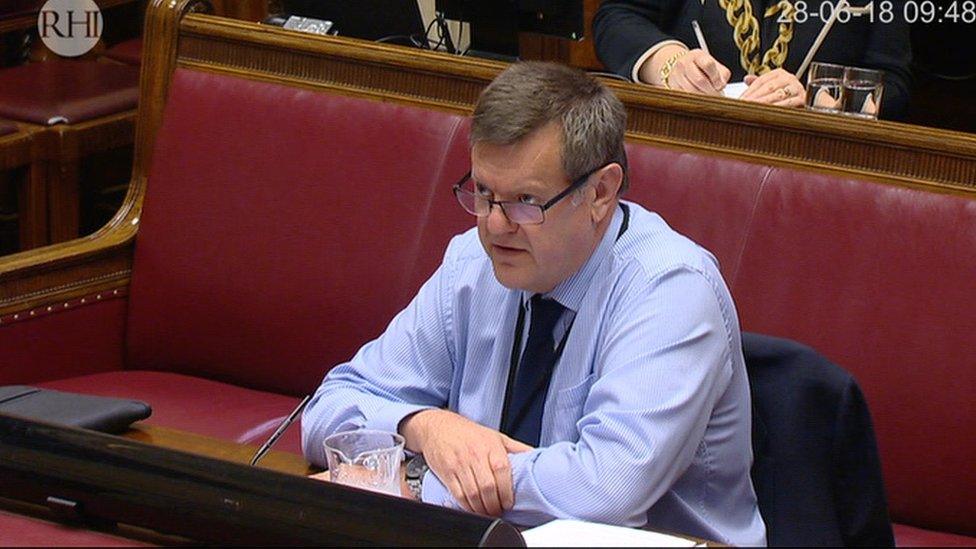
Chris Stewart is the deputy secretary in the Economy Department and held a senior position as the RHI scheme disintegrated
The RHI inquiry has heard a claim that there was an attempt to "protect" Arlene Foster during the closure of the flawed green energy scheme.
The claim was made on Thursday afternoon during the evidence session of a senior civil servant.
Chris Stewart was asked why references to the Office of First and Deputy First Minister were taken out of government papers about the closure of the scheme.
Mrs Foster was first minister at the time.
He said it had been done at the request of DUP SPAD (special adviser) Timothy Cairns, but without the knowledge or permission of his minister Jonathan Bell.
Mr Stewart said he assumed when he was asked to make the changes that Mr Bell had agreed to them.
The fact that he hadn't emerged after an angry meeting in February 2016.
Mr Stewart said he believed that a strategy was emerging at that stage to make Mr Bell responsible for what was going to be a difficult and contentious decision.
"There was a desire for the difficult and potentially controversial decisions on this matter to be presented as having been made solely by Minister Bell, without any involvement in the decision making from anywhere else," he said.
"I think there was a strategy emerging for Jonathan Bell to be front and centre on the decision making on RHI."

What is RHI?
The RHI (Renewable Heat Incentive) scheme was set up by the Northern Ireland Executive in 2012, as a way of encouraging businesses to switch from using fossil fuels to renewable sources for generating their heat.
Those who signed up were offered financial incentives to buy new heating systems and the fuel to run them.
The scheme's budget ran out of control because of critical flaws in the way it was set up: claimants could effectively earn more money the more fuel they burned because the subsidies on offer for renewable fuels were far greater than the cost of the fuels themselves.

Mr Stewart said there may be a "link between that and the reference in Timothy Cairns' witness statement to protecting Mrs Foster".
Mr Cairns' witness statement has not yet been published and he will not now give evidence until the autumn.
Mr Stewart said the issue might also refer back to the involvement of the then head of the civil service Sir Malcolm McKibben and an email exchange between two senior DUP SPADs.
Sir Malcolm had wanted to speak to Mrs Foster about the crisis and its financial implications.
That was referenced in an email between two senior DUP SPADS, Richard Bullick and Timothy Johnston.
Mr Bullick emailed Mr Johnston to say that Sir Malcolm "seems very concerned about spending out of control. Says will be a huge audit issue and AF (arlene Foster) better not implicated."
The inquiry heard that when Mr Bell discovered the references to the office of the then first minister had been removed, he was angry.
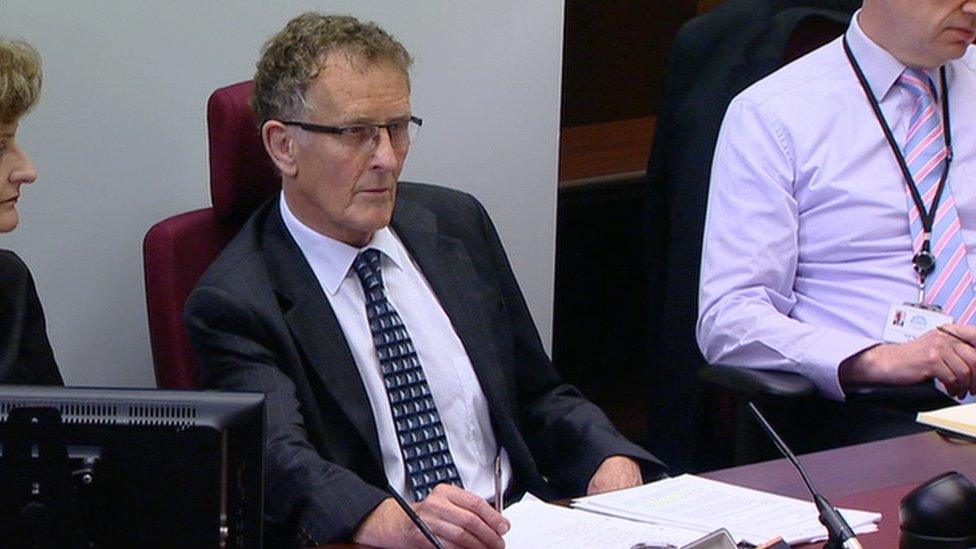
The RHI inquiry is chaired by Sir Patrick Coghlin
He confronted his SPAD at a meeting which led to a short-tempered exchange between Mr Cairns and Mr Stewart.
The civil servant later said he objected to Mr Bell's portrayal of him in an interview with the BBC's Stephen Nolan as a "whistleblower" who'd told him what had happened.
He also said that pressure from industry led to a final two-week delay before the scheme was closed for good.
He said he was "dismayed " when he discovered in that time that Moy Park had told its suppliers to "get in quickly" before the scheme shut.
Earlier, Mr Stewart said the DUP resisted the introduction of RHI cost controls because they didn't want to "hobble" a scheme they were being told was a good one.
He said in a long career he'd never experienced "resistance" like it.
The inquiry heard that in the summer of 2015 proposals for cost controls were referred to other DUP special advisers outside the department for advice on the best approach.
Mr Stewart said officials struggled to try and rein in scheme spending but they were met with what amounted to little more than "stalling tactics".
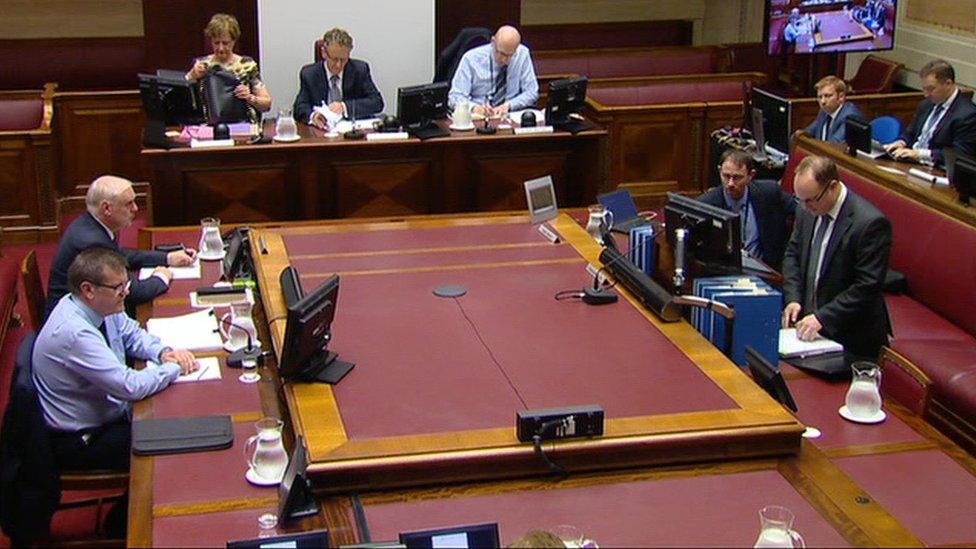
The inquiry was set up to investigate the circumstances surrounding the energy initiative after its costs spiralled.
It meant a two month delay before Mr Bell, the then enterprise minister, signed off on the controls.
It also led to the start date for the introduction of the measures being pushed back for an extra month allowing hundreds of extra boilers to be signed up to the scheme on the most lucrative tariffs.
Mr Stewart told the inquiry he formed the view that the DUP SPAD in the Department of Enterprise, Mr Cairns, was not personally opposed to the cost control measures.
"But he was reporting to me a much broader view amongst the DUP and a broader view that the DUP would have had, or a perception that the DUP would have had of the view of stakeholders which was that this is a good scheme - don't hobble it any more than is necessary," he said.
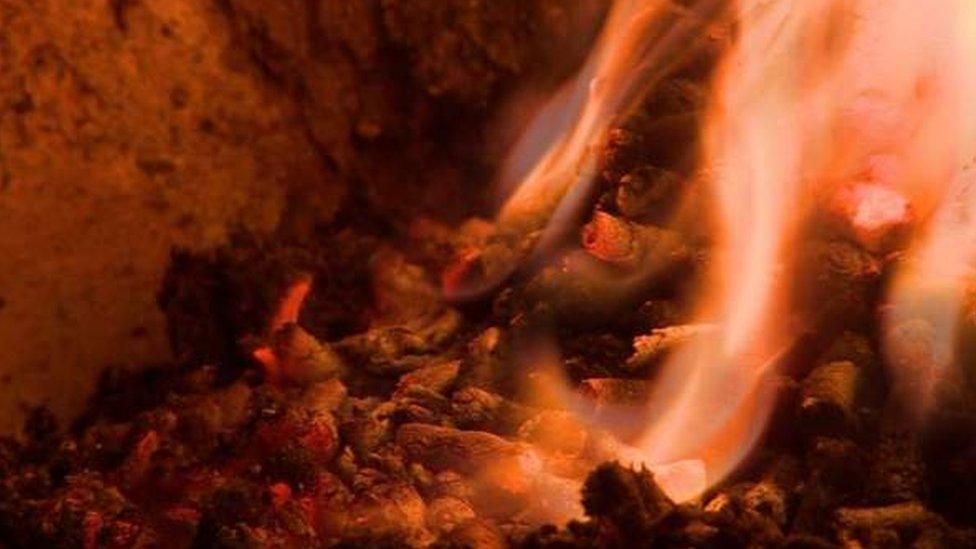
The most recent estimate put the projected overspend on the RHI scheme at £700m over 20 years, up from an original figure of £490m.
Mr Stewart said the DUP projected itself as a supporter of the agriculture industry, which was the main beneficiary of the scheme.
He said when officials put the case for cost controls there was "no reasoned argument" against it from figures in the DUP.
Instead officials were sent counter proposals which, in Mr Stewart's estimation, had little weight and did not provide value for money.
The inquiry has heard that at least one of these proposals came from Arlene Foster's then SPAD in the Department of Finance, Andrew Crawford.
Mr Stewart said at the outset he had a "benign interpretation" of the SPADs' reluctance to get on with curbing the costs of the scheme.
He said he believed then that it was because they felt officials were too cautious and risked "hobbling" the scheme before it was necessary to do so.
"As the resistance went on I found it, and still find it, more and more difficult to have such a benign interpretation of it.
"But I don't know what the actual reason was for it," he added.
- Published28 June 2018
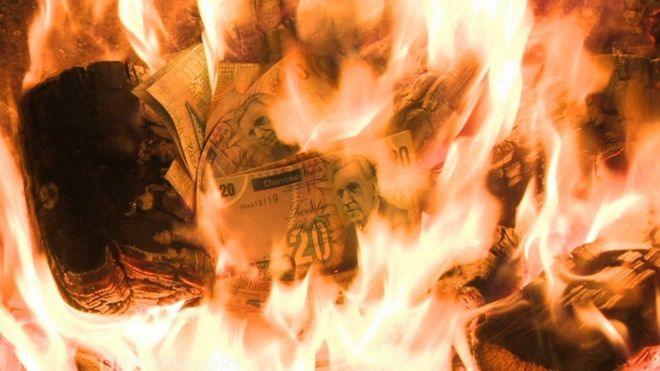
- Published7 November 2017
